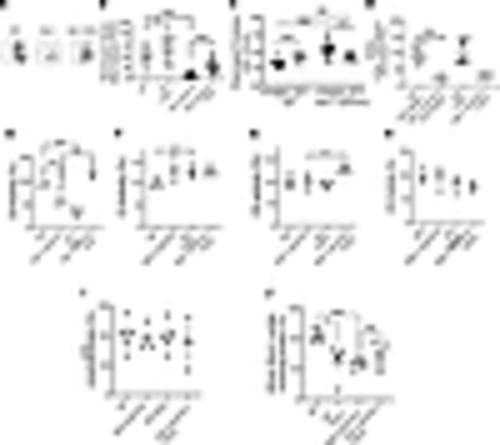Fig. 4
- ID
- ZDB-FIG-220824-75
- Publication
- Lavorato et al., 2022 - Dichloroacetate improves mitochondrial function, physiology, and morphology in FBXL4 disease models
- Other Figures
- All Figure Page
- Back to All Figure Page
|
DCA treatment rescued egg-laying behavior, pharyngeal pumping function, and mitochondrial function in fbxl-1(ok3741) worms. (A) Visualization of worm progeny using semiautomated Wormscan method, showing reduced density of fbxl-1(ok3741) worms as compared with WT worms in control media, and recovered density of signal in the well with DCA-treated fbxl-1(ok3741) worms. (B) Difference image score obtained with WormScan method and normalized using percentage of control (POC); fbxl-1(ok3741) worms (n = 38) and WT worms at baseline (n = 35); n = 57 for 25 mM DCA treated bxl-1(ok3741) and n = 31 for DCA-treated WT worms; (mean ± SEM). (C) Pharyngeal pump rate in untreated and DCA-treated (25 mM) 1-day adult fbxl-1(ok3741) and N2 WT worms. n = 25 worms/strain in control media; n = 20 worms/strain in DCA media; 3 biological replicates. (D) Untreated and DCA-treated worms’ swim activity analyzed by ZebraLab; n = 12 DCA-treated worms; n = 11 untreated worms; (mean ± SD). (E–H) RC enzyme activity of CS, complex I (CI), CII, and CIV was quantified in untreated and DCA-treated WT and fbxl- 1(ok3741) synchronized day-1 adult worm populations. All rates are expressed as percentage of normalized WT control. n = 3 per condition; (mean ± SEM). One-tailed t test performed for statistical analysis. (I) ATP levels in whole worms were unchanged in fbxl-1(ok3741) worms relative to WT worms in untreated and DCA-treated conditions (mean ± SEM). n = 5 each strain. (J) Whole worm lactate evaluated in fbxl-1(ok3741) worms relative to WT worms (mean ± SEM). n = 5 each strain. Significance was determined using unpaired Student’s t test. *P < 0.05, **P < 0.01, ***P < 0.001. Bonferroni’s correction method was applied to account for multiple comparisons, and significant findings still held. |

